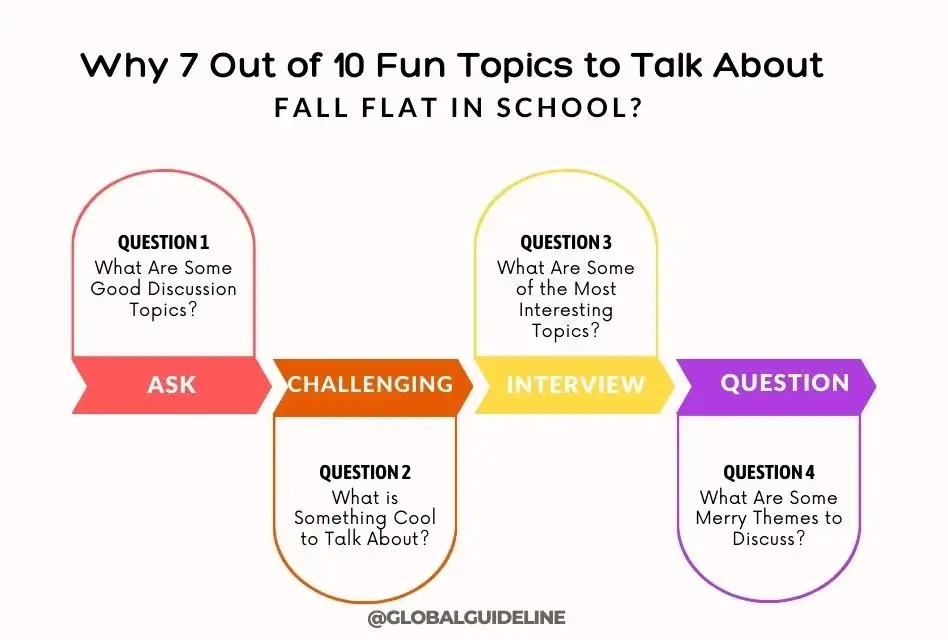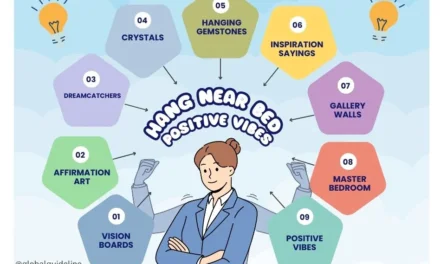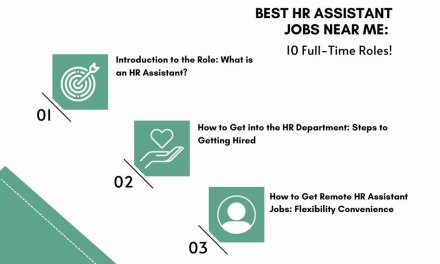Conversation is the backbone of interaction and good relationship building within schools, work, and social set-ups. It is a very good way of breaking ice and bonding with people and mirroring creativity in discussion. However, finding fun topics to talk about that would be of interest to everyone is a challenge at times, especially in schools. Indeed, as it comes under observation and study, 7 out of 10 fun topics to talk about get flopped in a school setting. How and why does it happen, and how are we to better meet the conversational challenges of educational settings?
In this paper, we are going to discuss some of the reasons as to why certain topics fail to excite students in school, what makes it fun and exciting, and give some practical tips on how to choose the right conversation starters. We will also cover some original and unusual topics of discussions, which are bound for success with your group of leading meaningful discussions. Whether one is a student, teacher, or one interested in developing better conversation, this will be an important set of insights into making school discussions more effective for all concerned.
Table of Contents
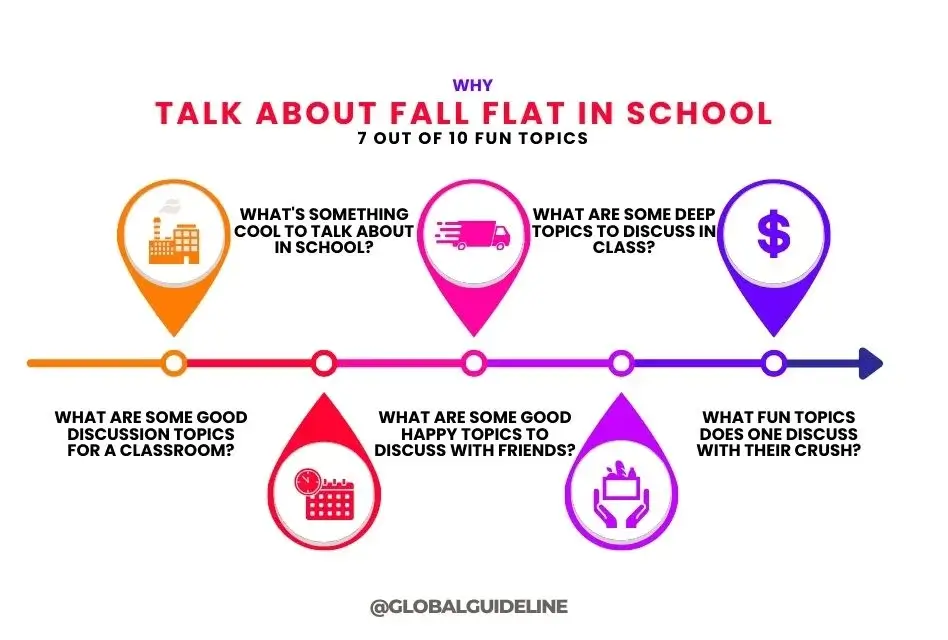
What Are Some Good Discussion Topics?
Whether or not a topic of conversation works depends utterly on context and audience. The school is made up of individuals with their unique backgrounds, interests, personalities, and social dynamics. What may work for one group might very well make another bored out of its pants or simply not relate to them. Following are some common reasons why fun topics to talk about often don’t work in school:
- Relevance: What is exciting and interesting for one may turn out to be utterly irrelevant for another. For example, video games could be discussed; this discussion would simultaneously thrill the gamer students and make them the target of exclusion by the non-gamers.
- Complexity: Some subjects might be too complicated or profound to be grasped by a young audience that might lead to more confusion than engrossment. Deep topics of philosophy or politics are not expected to be discussed at a level younger students can understand since they have not yet developed an interest or the understanding in them.
- Social Dynamics: Most students’ reactions depend a great deal on peer pressure or the presence of social hierarchies. The more influential students may make certain subjects seem uncool or unpopular; hence, others may be reluctant to become involved, even if such subjects interest them.
- Cultural Sensitivity: In especially multicultural schools, some topics can unintentionally touch sensitive cultural or personal points in some of their students and thus make them feel uncomfortable or even offended.
- Attention Span: Generally, the attention spans of students are likely to be short; some topics that may call for deep focus or which require a discussion that is a bit too long will barely hold their attention.
- Teacher Influence: Sometimes, the way a teacher presents himself or herself determines the reception of a topic. If the teacher appears uninterested and does not provide an atmosphere of all-inclusiveness, even the most pleasurable subjects to discuss become at once uninteresting.
- Distractions: Using social media, smartphones, and other cell phone-related distractions, makes it hard to keep the students focused on any topic, however fun or interesting it may be.
What is Something Cool to Talk About?
So, if 7 out of 10 fun topics to talk about fail, what makes the other three succeed? The answer lies in understanding the characteristics of engaging topics and how to present them in such a manner that they are agreeable to students. Here are some tips for choosing cool and engaging topics to discuss at school:
- Relatability: Select topics through which the students can relate on a personal level. Topics related to favorite childhood memories, present-time favorite television programs, or sources of hidden talents are more likely to resonate because they let students share personal experiences and learn more about each other.
- Novelty: Introduce top new things to discuss. For instance, discussing unusual hobbies, recent trends, or new discoveries may spur curiosity or even provoke them to take part.
- Humor: The most mundane topic will become entertaining, as it is in the interaction; using humor, funny stories, embarrassing situations, or light-hearted debates is a good way of sustaining it.
- Interactive elements: The topics which contain some kind of activity, be it a game, quiz, or some kind of role-play, are considered to be more provocative for the students. Asking them to tell something about their bucket lists or to say something about road trips and, if it is the favorite one, may turn the topic into discussion.
- Relevance to Current Events: Discussion of current events or popular culture can make the conversation all the more interesting. Discussions of a popular social media challenge or a box office movie spur many lively conversations.
What Are Some of the Most Interesting Topics?
These should be discussing the most interesting topics in school, taking into consideration the students’ interest levels and their varied tastes. A few examples of topics which will keep a majority of students glued to the discussions across different age brackets include:
- Special Talents and Skills: These include asking students to share their hidden talents or skills that could yield interesting discoveries, and allow the class to get to know one another better.
- Favorite subjects in school: To talk about how certain subjects could be more enjoyable, one would introduce the discussion to personal interests and later plans for a career.
- Childhood Memories: Funny or memorable experiences from childhood would make things sound so nostalgic and build up the bond with others in the circle.
- Pet Peeves: Discussing common peeves is entertaining and relatable; it will surely spur light debates.
- Bucket List Items: Talking about bucket lists can open a very exciting avenue for talking about dreams, goals, and aspirations.
- Trends on Social Media: Inquiring into the latest trends on TikTok or Instagram might be of great interest to active social media students.
Why Fun Topics Fail at School?
Despite the best effort, there are so many fun topics to talk about that actually fail in school environments. Here are some of the reasons:
- Misfitting Interests: Student interests are highly varied. There are those topics which turn some students from a group on, but which will bore another group of people. For instance, discussing a particular sport will only interest the students who follow that sport.
- Overly General Topics: Generalized topics such as “What is something that makes you happy to talk about?” might not bring enough specificity to the table to allow students to converse deeply about one aspect.
- Lack of Depth: Even though fun topics are supposed to be light, they do need some meat to them to sustain a conversation. If a topic is too shallow, it may quickly bore students.
- Peer Influence: Within a school context, these children influence one another. If one or two find it uncool, the result is mass disengagement.
- External Pressures: Concerns over schoolwork, social fears, or even the time of day, might impact on children’s receptivity to particular subjects.
What Are Some Merry Themes to Discuss?
A positive and energetic atmosphere in the classroom is created only when genuine discussions have been brought on board. Some of the happy and uplifting topics which are likely to resonate with students are highlighted here:
- Favorite TV Shows: Discussion on favorite TV shows allows students to connect to each other by finding common interests or something new to watch.
- Best Vacation Experiences: Exploring cultures through discussion on past vacations might become pretty interesting.
- Random Acts of Kindness: I encourage sharing acts of kindness; it fills the atmosphere with positive and inspirational stories.
- Favorite Family Traditions: This could be anything really out of the ordinary that is done within the family. Students make for interesting discussions about cultural differences and similarities.
- Hobbies and Passions: Talking about hobbies and passions apart from school may bring out common interests and new friendships.
How to Keep Conversations Interesting
Interesting topics of conversation will always work at school if this formula keeps the conversation dynamic and inclusive. Following are the ideas to do so:
- Use open-ended questions. Open-ended questions help students explain in detail and make the conversation flow. For example, instead of asking, “Do you like sports?” ask, “What is the most memorable game you have ever played or watched?”
- Encourage participation. Allow every single one of your students to feel free to say something. This can be supported by setting clear expectations for respect and active listening.
- Mix Up the Format: Discussions can be kept interactive with students if the format is changed around. For instance, group discussions one day, then on another day personal one-to-one conversations with the teacher or debates across the class.
- Incorporate Multi-Media: You can create interaction in a discussion by adding media to it such as videos, music, or images that relate to the topic.
- Go With the Flow: Be able to change topics when one is not working. Many times, moving to another topic or even just asking students for input rejuvenates the discussion.
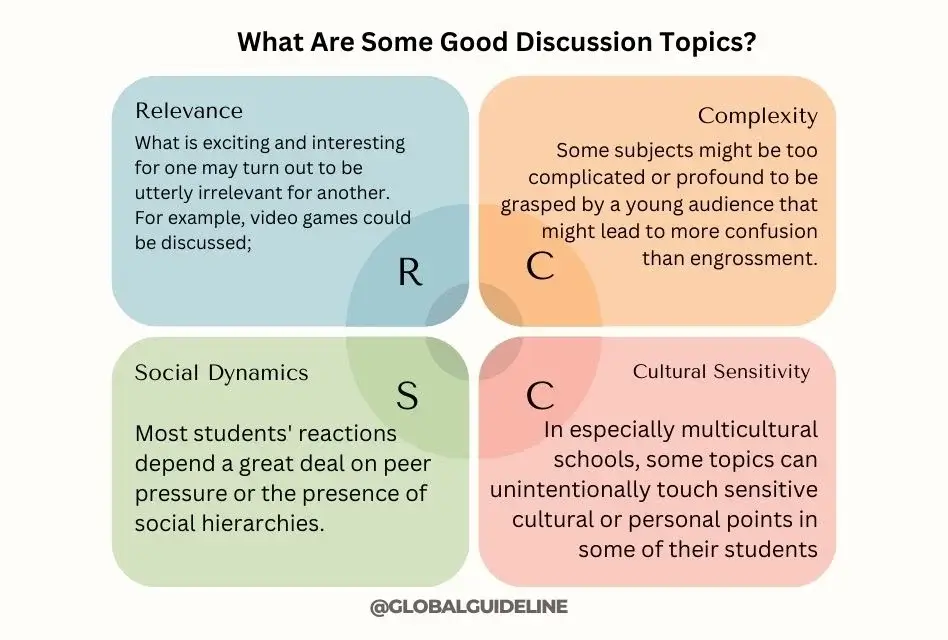
Job Interview Questions and Fun Topics
Job interviews are extremely intimidating, but you can provide a few reasons to remember you with discussing fun and exciting topics. You can prepare some of the following methods when you’re asked about hobbies, interests, or experiences:
- Relate your interests to the job: If you are asked to describe your favorite hobbies or pastimes, try to relate them to the skills or qualities required in the job. For example, if you enjoy taking road trips, you may want to discuss how they have taught you to plan, organize, and adapt to new situations.
- Showcase Your Hidden Talents: Sometimes, a hidden talent or unique skill set will make you very well-remembered to interviewers. Suppose you have a talent for public speaking; you will be able to expand on how such a talent helped in leading group projects or presentations.
- Share Positive Experiences: Past experiences one may wish to discuss would be stories that help bring out positive attributes in one’s character. This could be one’s favorite subject at school, the best ever family vacation, or even an achievement of great magnitude.
- Good use of conversation openers: If you have the opportunity to ask any questions or to redirect the conversation, use good conversation openers based on the job and company culture. For example, you can ask about recent organization accomplishments or team-building activities that show interest in building a positive work environment.
- Inclusion of Your Learning Experiences: Besides academics, discuss your learning drawn from other areas of life-for example, how you have faced embarrassing situations or utilized your free time constructively. Relate these experiences to the way you will approach your work.
FAQs
What are some good discussion topics for a classroom?
Good discussion topics that would be applicable in the classroom might be things like favorite hobbies, recent trends on social media, or interesting conversation topics for adults. Discussions that open up personal sharing can be found in such topics as favorite memories or childhood experiences.
What’s something cool to talk about in school?
Something cool to talk about in a school setting could be any recent road trip, some hidden talent, or the latest TV show. This would most likely be associated with students and make sure they participate because they express themselves and give them commonalities to share.
What are some good happy topics to discuss with friends?
Other happy topics to talk about with friends concern favorite vacation spots, items on your bucket list, or random acts of kindness. These topics are light-hearted and uplifting to discuss casually.
What are some deep topics to discuss in class?
Deep topics to discuss in class may concern ethical issues, philosophical questions, or discussions about future aspirations. This topic induces critical thinking, which will usually result in substantial insights or meaningful conversations.
What fun topics does one discuss with their crush?
Favorites could include movies, things that bother them, or embarrassing moments. These are light and playful topics to help loosen up the atmosphere, if it’s tense, and really get to know one another.
What is the best topic for chatting in a job interview?
The best topic to talk about in a job interview is one that reflects upon your related skills and experiences. Discussions over a unique topic, such as a project you have a passion for or a hobby from which you have gained serious lessons in life, can make you distinctive.

Conclusion
The bottom line is that selecting fun topics to discuss is extremely difficult at school, while with the right approach, it surely is possible to make the conversations engaging and meaningful. Understand what kills a topic and focus on aspects that relate to the interests and experiences of the students to create an inclusive and dynamic discussion environment.
Be it for preparing for a class discussion, finding interesting conversation topics, or even preparing for a job interview, the essence is the same: be flexible, relatable, and interesting. Remember, the most interesting topics to talk about will also need the right presentation and enthusiasm if they are ever to really capture your audience. With these tips and insights, you will be in a better position to handle the complexity arising at school conversations and render every topic an enjoyable and successful one.

